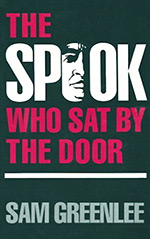
![]() bazhsw
bazhsw
2/23/2024
![]()
The first couple of chapters into this book and I knew I was reading something special. I discovered 'The Spook Who Sat by the Door' from Nisi Shawl's 'A Crash Course in Black Science Fiction' http://www.nisishawl.com/CCHBSF.html and I really enjoyed it with some qualifications.
Written in 1969, 'The Spook Who Sat by the Door' is the story of Dan Freeman who, following a senator's attempts to win black votes criticises the CIA for having no black officers. The CIA in typical performative ways undergoes a period of which only one person graduates - our Freeman. Freeman is then typically treated as a glorified tea boy who uses the skills he gains when he leaves the CIA to organise a black revolutionary insurrection across America.
So is it fantasy or science fiction? There are no speculative elements here beyond the author's imagination of 'what if?' and imagining a different future if the black population realised their own power and rose up. It does read as a fantasy I guess, or a wishful thinking on the part of the author.
The book is more akin to a spy novel or thriller in my view and it is also very pulpy. I do enjoy this kind of literature from time to time and sometimes have to hold my nose at elements but it is often a lot of fun, whilst having serious points delivered through razor point satire. So there are a lot of elements of the mass market paperback here - there is the 'shocking' content of armed black revolutionaries shooting up white soldiers. I can only imagine how apoplectic white readers would have been at this in 69 (and to be fair, I guess a lot of white people whose privilege is so baked in today would miss the message and feel the victim). There's lots of action, plenty of booze, and bedding women - all the archetypes of the spy novel.
Despite this (or more accurately because of this) the novel's message still hits home strongly. This novel tells it's readers to beware if you are white, and pay attention if you are black. It demands that the reader to stop turning a blind eye to racial oppression and the systems that support white supremacy. I am reminded that following the Black Lives Matter protests how any sign of protest is met with incredulity from some white people as if to say, 'what are you upset about'. (I also see the same with Palestinian resistance - any time the oppressed respond it is seen as 'starting conflict' rather than responding to it).
The first couple of chapters are brilliant satire but cutting. Greenlee is scathing on his attacks on white racists who only view black people in terms of what they can get out of them (votes, labour etc.) and the horrible attitudes where people consider black people stupid, ignorant, without culture. It's horrible to read (and I say this recognising I am white, and that black readers would have a more valid emotional response). But it's not just 'cut out' racists that are cut down - Greenlee goes for the white liberal, who gets a good career out of being an ally to black people, whose continued oppression supports their career. He also gives both barrels to black middle class people (described as integrated) and how they support the system alongside black cops etc. I can't put into words easily how effective these depictions are - particularly from a class perspective, recognising how black and brown faces in leadership positions doesn't materially end systemic racism. One reads how white people cannot see black people at all - not just their talents, hopes, dreams, desires, but also when they are planning an insurrection and running rings around them.
Where the book falls down for me is on two points - first the depiction of Dan Freeman as a superman. He is a perfect athlete, judoka, marksman. He becomes an expert in strategics, weaponry, and an excellent scholar and spy. Furthermore, he manages to train street gangs in said tactics who are remarkably effective. In some ways I get it - Greenlee is asking black readers to stop seeing themselves as inferior and to realise they can be as capable as any white person, but it does wear a bit thin that he is perfect at absolutely everything. He doesn't really overcome any challenges in the novel as such.
The other point that brings this book down is the misogyny throughout the book. There are only a few women in the book, one is a partner who cheats on her husband with him who is depicted as untrustworthy with middle class aspirations, the other is a sex worker who is continually described as a 'whore' - oh yeah, she's gay but she really likes Freeman. Come on... I get 'standards of the time' and also it's a pulpy thriller genre, or even 'that's how people talked' BUT I don't think Greenlee gets a free pass here. He is asking the reader to stop taking black people for granted, he is asking black people to rise up and drawing on every horrible dismissive attitude to black people to show how wrong it is, then displays those same attitudes to women. One could easily replace 'black' with 'women' and 'whitey' with 'men'. One could easily have a book about middle class women in leadership positions, and the impact they have on women's liberation. That the challenges of race and gender intersect is lost on Greenlee - he doesn't have a single black female revolutionary in his novel and the book is weaker for it. He is asking us to take the racial blinkers off, whilst he wears his patriarchal ones proudly.
This said, it is still well worth reading - it is a call to arms (figuratively and literally), it is a rallying call and asks the reader to dream a new future. Highly recommended